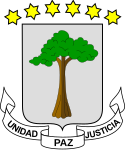
Equatorial Guinea, also rarely known as Equatoguinea, officially the Republic of Equatorial Guinea, is a country on the west coast of Central Africa, with an area of 28,000 square kilometres (11,000 sq mi). Formerly the colony of Spanish Guinea, its post-independence name refers to its location near both the Equator and in the African region of Guinea. As of 2021, the country had a population of 1,468,777, over 85% of whom are members of the Fang people, the country's dominant ethnic group. The Bubi people, indigenous to Bioko are the second largest group at approximately 6.5% of the population.

Convergence for Social Democracy is the opposition party in Equatorial Guinea. It was the only opposition party with parliamentary representation during 2013-2017.

Elections in Guinea-Bissau take place within the framework of a multi-party democracy and a semi-presidential system. Both the President and the National People's Assembly are directly elected by voters.

The Chamber of Deputies is the lower house of the Parliament of Equatorial Guinea.

Presidential elections were held in Equatorial Guinea on 15 December 2002. Incumbent President Teodoro Obiang Nguema Mbasogo easily won another term amidst an opposition boycott.

Early parliamentary elections were held in Equatorial Guinea on 4 May 2008, alongside local elections; 100 seats in parliament and 230 council seats were up for election. The ruling Democratic Party of Equatorial Guinea won 89 seats in parliament.

Presidential elections were held in Equatorial Guinea on November 29, 2009. Teodoro Obiang Nguema, who has been President since 1979, ran for another term and won re-election with 95.8% of the vote, according to official results. Opposition leader Plácido Micó Abogo placed second with 3.6%. However, international observers and the main opposition candidate questioned the legitimacy of this election, noting the poor management which created an unfriendly field for other candidates to take part, media manipulation and the unbalanced results.
Celestino Bonifacio Bacale Obiang was an Equatoguinean politician. He was the Secretary of International Relations and Cooperation of the Convergence for Social Democracy (CPDS).
Plácido Micó Abogo is an Equatoguinean politician. He has been the Secretary-General of the Convergence for Social Democracy (CPDS), an opposition political party in Equatorial Guinea, since 1994.

Parliamentary elections were held in Equatorial Guinea on 3 and 10 July 1988. The Democratic Party of Equatorial Guinea (PDGE), established the previous year, was the sole legal party at the time, as an attempt at legalising the opposition Progress Party of Equatorial Guinea in June had failed. The PDGE presented a single list of 60 candidates for the 60 seats, which was reportedly approved by 99.2% of voters.

Presidential elections were held in Equatorial Guinea on 25 June 1989, the first since 1968, although incumbent Teodoro Obiang Nguema Mbasogo had his seven-year term starting in 1982 approved in a referendum in 1982. He was the only candidate and was re-elected unopposed with 99% of the vote.

Parliamentary elections were held in Equatorial Guinea on 21 November 1993. They were the first multi-party elections in the country since the pre-independence elections of 1968. Although seven parties were allowed to run in the election, the ruling Democratic Party of Equatorial Guinea (PDGE) maintained its grip on power, winning 68 of the 80 seats in the enlarged Chamber of People's Representatives. According to official figures, voter turnout was 67%. The Joint Opposition Platform, an alliance of eight opposition parties, called for a boycott and claimed voter turnout was as low as 20%.

Parliamentary elections were held in Guinea on 27 January 1980. The country was a one-party state at the time, with the Democratic Party of Guinea – African Democratic Rally as the sole legal party. The party produced a list of 210 candidates for the 210 seats, which voters were asked to approve. Voter turnout was reported to be 95.69%.

Parliamentary elections were held in Equatorial Guinea on 26 May 2013, alongside local elections. Following constitutional reforms approved in a 2011 referendum, they were the first elections in which the newly established Senate is elected. The ruling Democratic Party of Equatorial Guinea won all but one seat in both houses of Parliament.

The Senate is the upper house of the Parliament of Equatorial Guinea.

Presidential elections were held in Equatorial Guinea on 24 April 2016. In a vote initially scheduled for November but brought forward by seven months, incumbent President Teodoro Obiang Nguema Mbasogo retained his office with 93.7 percent of the vote.

Parliamentary elections were held in Equatorial Guinea on 16 December 1973. The new constitution approved in a referendum the same year provided for a 60-seat People's National Assembly. The United National Workers' Party (PUNT) was the sole legal party at the time, as the 1973 constitution had made the country a one-party state. The PUNT presented a single list of 60 candidates for the 60 seats, which was approved by voters.

General elections were held in Equatorial Guinea on 20 November 2022 to elect the President and members of Parliament, alongside local elections. Originally the parliamentary elections had been scheduled for November 2022 and presidential elections for 2023. However, in September 2022 Parliament approved a proposal to merge the elections due to economic constraints.
Events in the year 2022 in Equatorial Guinea.







